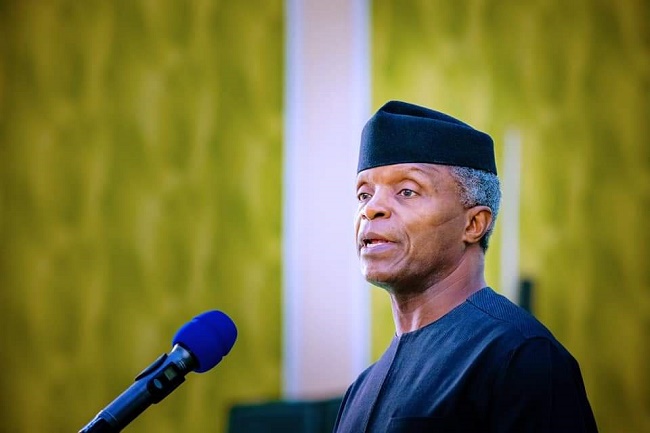Vice President Yemi Osinbajo says Nigeria will need to spend over $410 billion to deliver its energy transition plan by 2060.

Osinbajo’s spokesman, Laolu Akande, in a statement on Wednesday, August 24, 2022, in Abuja, said that the vice president spoke at the global virtual inauguration of Nigeria’s Energy Transition Plan.
The plan is a roadmap to tackle the dual crises of energy poverty and climate change.
The vice president highlighted the significant scale of resources required to attain both development and climate ambitions.
He said that Africa’s increasing energy gaps required collaboration to take ownership of the continent’s transition pathways and the action should be decisive and urgent.
“For Africa, the problem of energy poverty is as important as our climate ambitions.
“Energy use is crucial for almost every conceivable aspect of development; wealth, health, nutrition, water, infrastructure, education, and life expectancy are significantly related to the consumption of energy per capita.
“Nigeria would need to spend 410 billion dollars above business-as-usual spending to deliver our transition plan by 2060, which translates to about 10 billion dollars per year.
“The average $3 billion per year investments in renewable energy recorded for the whole of Africa between 2000 and 2020 will certainly not suffice,” he added.
The vice president he chaired the inter-ministerial Energy Transition Implementation Working Group.
According to him, the group is currently engaging with partners to secure an initial 10 billion dollars support package ahead of COP27 along the lines of the South African Just Energy Transition Partnership announced at COP26 in Glasgow.
Speaking on the effects of Climate Change in Africa, Osinbajo explained that climate change threatened crop productivity in regions that were already food insecure, and since agriculture provides the largest number of jobs, reduced crop productivity will worsen unemployment.
“It is certainly time for decisive action, and we just cannot afford to delay; African nations are rising to the challenge; all African countries have signed the Paris Agreement and some countries, South Africa, Sudan, Angola, and Nigeria have also announced net-zero targets.
“The current lack of power hurts livelihoods and destroys the dreams of hundreds of millions of young people.
“And although Africa’s current unmet energy needs are huge, future demand will be even greater due to expanding populations, urbanisation, and movement into the middle class.
“It is clear that the continent must address its energy constraints and would require external support and policy flexibility to deliver this.
“Unfortunately, in the wider responses to the climate crisis, we are not seeing careful consideration and acknowledgement of Africa’s aspirations.”
On other aspirations of the roadmap, Osinbajo said explained that the plan had the potential to create about 340,000 jobs by 2030, and 840,000 by 2060.
He said it also presented a unique opportunity to deliver a true low-carbon and rapid development model in Africa’s largest economy.
At the virtual event, Mr Shubham Chaudhuri, Nigeria Country Director for World Bank, said the bank planned to commit over $1.5 billion towards the Energy Transition Plan on renewable energy, power sector reforms, clean cooking, and wherever opportunities arose.
On his part, Mr Adam Cortese, Chief Executive Officer, Sun Africa stated that the inauguration of Nigeria’s Energy Transition Plan had further accelerated efforts, proving Nigeria to be fertile grounds for investments in the sector.
“We are in the final stages of discussion with US EXIM Bank on a 1.5 billion dollars financing package,” he said.
Speakers at the event commended Nigeria’s leadership and pioneering role in the region.
They emphasised the need for data-driven country-level energy transition plans that recognise the unique pathways each country would need to take in order to achieve a just, inclusive and equitable energy transition for all.
There were also remarks from Nigerian Ministers and officials including the Ministers of Environment, Mohammed Abdullahi, Power, Abubakar Aliyu; Works and Housing, Babatunde Fashola; Finance, Budget and National Planning, Zainab Ahmed; and Managing Director, Rural Electrification Agency, Ahmad Salihijo.
Other speakers included the Deputy Secretary-General of the UN, Amina Mohammed; Minister of Petroleum and Energies from Senegal, Sophie Gladima; and Minister of Electricity and Renewable Energy from Egypt, Mohamed El-Markabi.
Representatives of the United Nations, Sustainable Energy for All, The World Bank, African Development Bank, IRENA, The Rockefeller Foundation and the Global Energy Alliance for People and Planet also attended the event.
Olumide Idowu, a Nigerian climate change activist, in a presntation, said: “As we know, we cannot achieve a just and equitable energy transition without the proper resources.
“For too long, the scales have been unfairly tipped to benefit regions and countries that already have enough electricity to live a decent life and who already have access to flexible financing options.
“But climate change is an equal-opportunity hazard that will require all of us to find the resources needed for the world to transition. No one can be left behind in this global fight for our planet.
“We must move beyond discussions of how much to how soon we can finance the global transition.”
By Chijioke Okoronkwo
